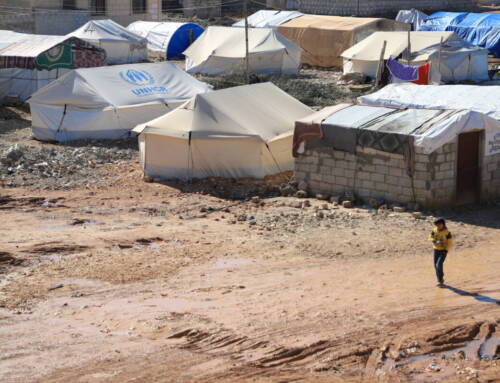Mona Yacoubian: ‘Jihadists have a number of cards to play to undermine a diplomatic solution’
January 16, 2014 The Geneva II peace talks are set […]
16 January 2014

The Geneva II peace talks are set to commence January 22, and observers inside and outside the country see little cause for optimism. Events on the ground continue to outpace diplomatic maneuvering, particularly with the Islamic Front—a coalition of seven hardline Islamist factions, with an avowed disinterest in the Geneva talks—emerging as arguably the most potent opposition force within Syria. The Front strongly opposes the Geneva process, with the organization’s military chief Zahran Alloush suggesting that conference participants from both the regime and opposition could be placed on a “wanted list” for targeting.
Mona Yacoubian is senior advisor for the Stimson Center’s Middle East program, where her work focuses on US policy toward the Arab transitions, with a particular focus on Syria.
In the second of a two-part interview, Yacoubian tells Syria Direct’s Alex Simon that the Geneva process—already a long-shot proposition—will likely be overshadowed by the extent to which “dynamics on the ground really have a life of their own.” One example, she says, is an emerging war-based economy that those benefiting from the chaos—among them increasingly powerful jihadist elements—will not relinquish easily: “There are actors who are vested in the perpetuation of the conflict.” Read part one of the interview here.
Q: Let’s say Geneva II is held, and somewhere down the road a diplomatic solution is reached. To what extent do you think that agreement could actually be implemented inside the country?
We should have no illusions that, even with a diplomatic solution, it’s going to take some time before there’s real change on the ground. We’ve seen over and over again how forces on the ground inside Syria evolve rapidly and independently. That’s what’s scary about Syria, particularly how we’re seeing this proliferation of extremist groups, the influx of foreign fighters—all of these dynamics on the ground really have a life of their own. That said, I would argue that, if we were to have a scenario with the US and key regional powers agreeing that there’s a shared interest in beginning to tamp down the violence, that can have a de-escalating impact; it’s going to be gradual, but nonetheless it’s important.
Q: What would be the mechanism for that de-escalation?
I think scaling back funding and arming, border controls becoming more strict, an attempt to try to persuade the political parties on both sides of the conflict that support will not be forthcoming unless there is a real effort to try and move the diplomatic agenda forward.
Q: What circumstances would have to be in place for Russia and Iran to see it as being in their favor to rein in Assad?
For me, it’s a question of at what point does Assad represent more of a liability than an asset to both Russia and Iran. I think in both cases, the growing influence of jihadist groups on the ground is an increasing cause for concern. So I could envision Russia and Iran separately coming to the conclusion that the status quo in Syria is undermining their own national interests, largely because of the spread of jihadism.
Q: What do you expect will be the jihadists’ approach to Geneva II?
Clearly their approach is going to be to try to undermine any move toward a diplomatic solution; these are folks that don’t believe in diplomacy, that are not only not interested in sitting around the table but are really interested in smashing the table and eviscerating those that are sitting around it.
Jihadists have a number of cards to play to undermine a diplomatic solution, and there are a number of ways in which a fragmenting Syria works to their advantage. The fragmentation that we’re seeing on the ground is putting the jihadists in a solid position to influence events to their advantage.
In addition, I think we’re seeing the extent to which you have a war-based economy. There are actors who are vested in the perpetuation of the conflict—from criminal activities, from smuggling, from other things. This, too, disproportionately favors jihadist groups and extremists on the ground.
Q: Where does the Islamic Front fit into this conversation, as hardline Islamists who are less extreme than ISIS and Jabhat a-Nusra but still not aligned with US interests?
The Islamic Front has been largely opposed to the Geneva process, particularly as it is currently construed. Some of the more hardline groups have deemed participation in the talks to be an act of treason. Thus far, the US has tried without success to open a channel to the Islamic Front and encourage some its leaders to participate in or endorse Geneva II.
Moreover, these groups remain deeply committed to the establishment of sharia law in Syria, rather than pluralistic democracy—certainly not the ideal for Syria’s transition from a US perspective. Given the significant chasm that exists between Syria’s political opposition-in-exile and the armed groups fighting on the ground, it is difficult to see how the political opposition negotiates on their behalf, let alone ensures that negotiated outcomes are implemented on the ground.
For more from Syria Direct, like us on Facebook or follow us on Twitter.






